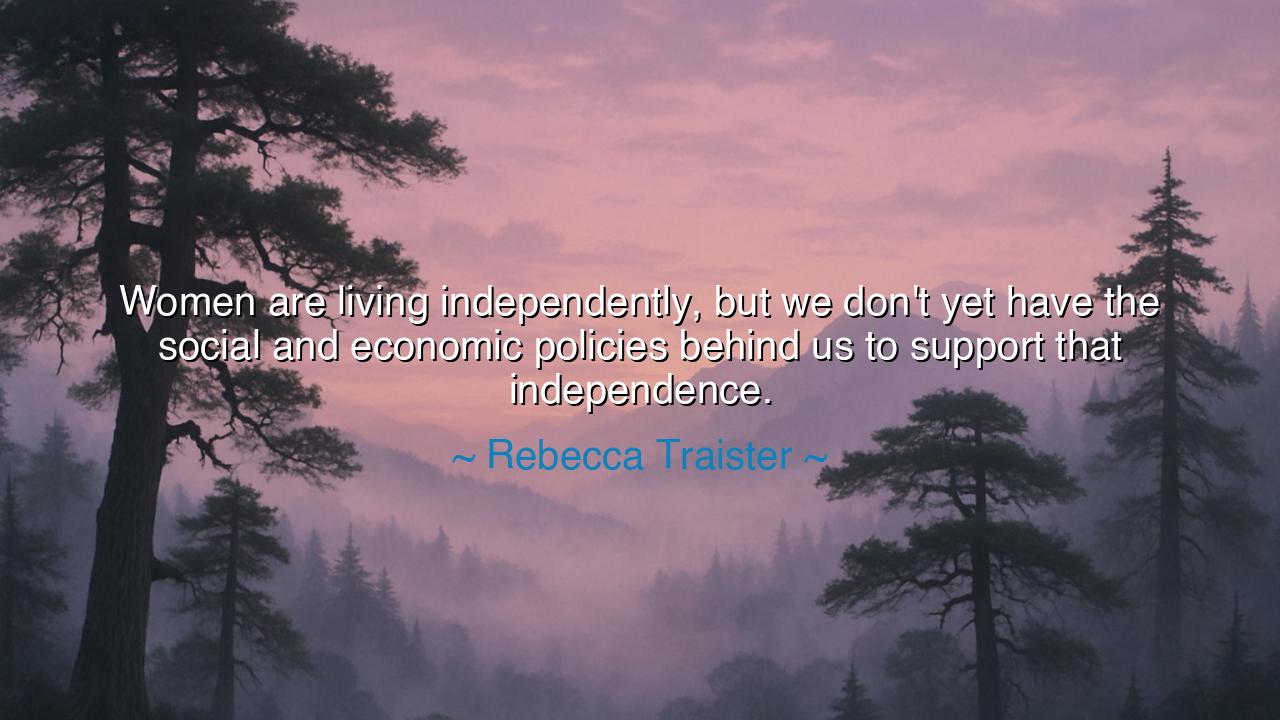
Women are living independently, but we don't yet have the social
Women are living independently, but we don't yet have the social and economic policies behind us to support that independence.






“Women are living independently, but we don’t yet have the social and economic policies behind us to support that independence.” Thus spoke Rebecca Traister, a chronicler of modern womanhood and the shifting tides of freedom, whose words pierce to the heart of one of the great contradictions of our age. For though the chains that once confined women to dependency have been broken in body, they remain in spirit — not by law, but by the lingering neglect of systems that were never built to sustain the independent woman. Her statement is both triumph and warning, for it recognizes that liberation is only half-won when the structures of society have yet to evolve to meet the reality of its people.
The meaning of Traister’s words lies in the tension between progress and completion. She celebrates a truth that would have been unthinkable a century ago: women living freely, building lives and livelihoods of their own, answering not to fathers, nor husbands, but to the call of their own will. Yet her tone bears sorrow too — for this freedom is often lived without the scaffolding of justice. The independence she describes is personal, but it is not yet fully protected. The roads may be open, but they are uneven and dangerous still, paved by courage rather than policy.
To understand this, one must look to history, where the first glimmers of women’s independence were often met with disbelief or resistance. In the 19th century, when Elizabeth Cady Stanton and Susan B. Anthony fought for women’s right to vote, they faced ridicule and exile from polite society. Their cause was not only political but spiritual — a demand that women be recognized as full citizens of their nations and of their own lives. When the right to vote was finally won, many thought the battle ended. Yet as Traister reminds us, the victory of independence is not a moment but a continuum — for laws may open doors, but hearts and institutions must still learn to let women walk through them unhindered.
Even today, the struggle continues in quieter, subtler forms. A woman may earn her own wage, yet face unequal pay. She may raise a child alone, yet find no policies to protect her time, her income, or her dignity. She may pursue her career with skill and ambition, yet find herself punished for her motherhood, her gender, or her refusal to conform. Thus, Traister speaks not of the independence of individuals, but of the unfinished independence of society itself — a world still ruled by systems built for men, now forced to reckon with the freedom of women who no longer ask permission to live.
There is a story, ancient and instructive, that mirrors this truth. In the legends of Greece, the goddess Athena sprang fully formed from the head of Zeus — a woman of wisdom and war, independent and unmatched. Yet even she, in all her power, found herself bound by the order of Olympus, serving within a hierarchy that had no place for her true equality. So it is with the women of our time: they have emerged brilliant and capable into a world still ruled by the remnants of an old order. Their strength is undeniable, yet the world around them has not yet caught up to their becoming.
What Traister calls for, then, is not mere recognition, but reconstruction — a rebuilding of the social and economic foundations to match the reality of modern life. To truly support independence, society must create policies of fairness, systems of care, and workplaces that honor the balance between labor and life. Freedom must not be a burden to bear alone, but a state sustained by justice. For independence without support becomes exhaustion, and liberation without structure becomes fragility.
Let this be the teaching passed to the generations to come: independence is not the end of struggle, but the beginning of stewardship. When one person rises, the world must rise with them — its laws, its institutions, its compassion. Do not rest in the illusion that equality achieved in spirit is equality fulfilled in practice. To truly honor freedom, we must build a society worthy of it — one that nourishes rather than drains, that uplifts rather than isolates, that gives every soul the strength to live as they choose.
And so, dear listener, remember this: personal independence is sacred, but collective responsibility is divine. It is not enough to break one’s own chains; one must help dismantle the forge that made them. Fight not only for your freedom, but for the world that must sustain it — so that one day, no woman’s liberty need depend upon her endurance alone, but upon the justice that all have built together.






AAdministratorAdministrator
Welcome, honored guests. Please leave a comment, we will respond soon